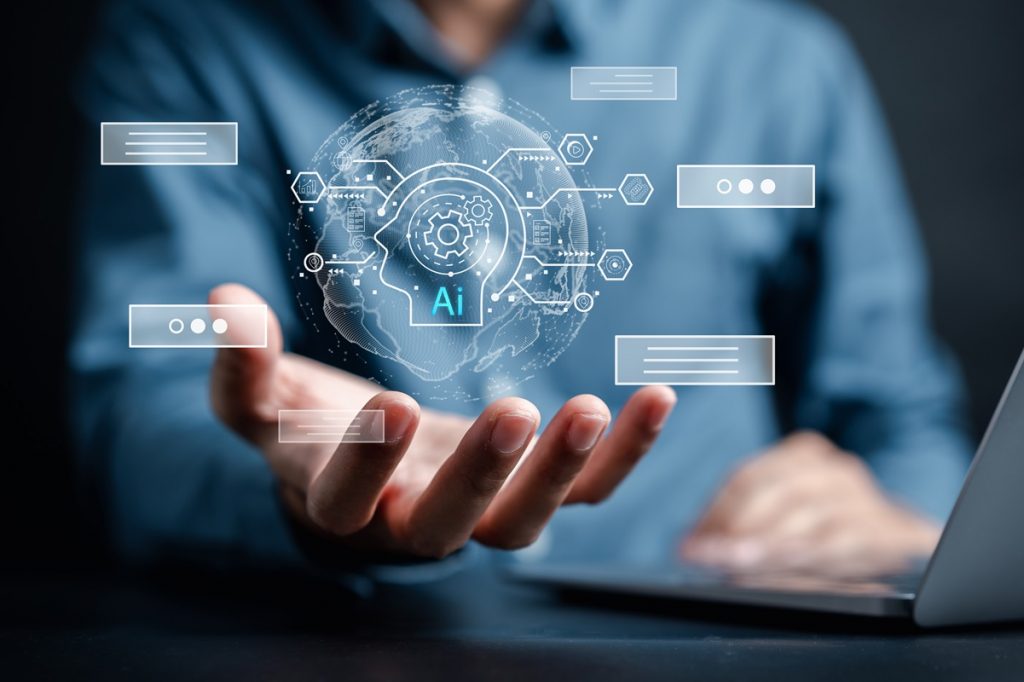The human landscape of business is on the cusp of a significant transformation, driven by the emergence of generative artificial intelligence (generative AI). This powerful technology, capable of creating novel content and experiences, holds immense potential to reshape HR practices, demanding adaptability and strategic foresight from organizations. This article explores how generative AI will influence HR and examine how businesses can navigate this change responsibly.
Generative AI – A Game-Changer for HR
Generative AI’s influence will touch multiple facets of HR:
- Recruitment and Talent Acquisition: AI-powered systems can identify top talent more efficiently, create personalized job descriptions, and generate interview questions tailored to specific roles.
- Employee Onboarding: Generative AI can personalize onboarding materials and create interactive, self-paced learning experiences to streamline the process.
- Learning and Development: AI can curate personalized learning paths, recommend relevant training content, and even personalize coaching approaches based on individual needs.
- Performance Management: AI can generate customized feedback reports, identify skill gaps, and suggest interventions for improvement.
- Employee Engagement: AI-powered chatbots can offer 24/7 support, answer frequently asked questions, and personalize employee communications.
Adapting Change Management Strategies
As generative AI becomes more prevalent in HR, organizations will need to adapt their change management strategies to effectively integrate this technology. This shift brings about various implications for managing AI in HR. By proactively addressing these implications, businesses can successfully navigate the intersection of AI and HR while maximizing the benefits of this transformative technology.
- Transparency and Communication: Openly communicating the benefits and limitations of generative AI builds trust and reduces apprehension.
- Upskilling and Reskilling: HR professionals need training to understand and utilize generative AI effectively.
- Human-Centered Approach: While AI automates tasks, human connection remains vital. Focus on upskilling employees for higher-level tasks and personalized interactions.
- Ethical Considerations: Implement responsible AI practices that ensure fairness, transparency, and privacy in data collection and algorithms.
While AI offers significant benefits, it also presents complexities that demand thoughtful consideration.
- Data Privacy and Security:
- AI systems rely on vast amounts of data, including sensitive employee information. Ensuring robust data protection, compliance with privacy regulations, and safeguarding against breaches are critical challenges. Organizations must establish stringent data governance practices, encrypt data, and limit access to authorized personnel. Regular audits and transparency about data usage are essential.
- Bias in Algorithms:
- AI algorithms can inadvertently perpetuate biases present in historical data. If not carefully monitored and adjusted, these biases can impact recruitment, performance evaluations, and other HR processes. Regularly audit AI models for bias. Implement fairness-aware algorithms and ensure diverse representation in training data. Human oversight is crucial to identify and rectify bias.
- Fear of Job Loss:
- Employees may fear that AI will replace their roles, leading to job insecurity. Effective communication and transparency about AI’s role in enhancing tasks rather than replacing jobs are essential. By educating employees about AI’s purpose – to augment human capabilities, not replace them – organizations can resolve potential conflicts and prevent staff becoming disenfranchised. Emphasize reskilling opportunities and how AI can enhance productivity, leading to improved career opportunities.
- Technical Expertise:
- Implementing AI requires specialized skills. HR professionals need training to understand AI models, interpret results, and integrate AI tools effectively. Establish clear guidelines for AI usage and regularly assess ethical implications and involve stakeholders in decision-making.
- Ethical Considerations:
- Decisions made by AI systems can have significant consequences for individuals. HR must navigate ethical dilemmas related to transparency, fairness, and accountability. Establish clear guidelines for AI usage. Regularly assess ethical implications and involve stakeholders in decision-making.
- Change Management:
- Introducing AI disrupts existing workflows. It is crucial for organizations to have change management strategies that will help ensure smooth adoption and minimize resistance from employees. Involving employees early in the process, communicating the benefits of AI, addressing concerns, and providing training are all necessary steps to help ease the transition
- Operational Risks:
- AI systems can malfunction, leading to errors or incorrect decisions. Organizations must have contingency plans and risk mitigation strategies in place. This means regularly testing AI systems and having performance monitoring procedures in place performance. Managers should have suitable policies in place that will allow them to intervene if unexpected issues arise.
Building Responsible AI-Driven Organizations
Businesses need to integrate responsible AI into HR practices by ensuring transparency and accountability in the use of AI algorithms for recruitment, performance evaluation, and decision-making processes. By embedding responsible AI practices into HR functions, businesses can enhance fairness, trust, and ethical standards within their organizations.
- Data Governance: Establish clear guidelines for data collection, storage, and usage, emphasizing transparency and user consent.
- Algorithmic Bias Mitigation: Actively monitor algorithms for potential biases and adjust them to ensure fairness and equal opportunity.
- Human Oversight: Maintain human oversight at key decision-making points and ensure AI remains accountable to human values.
- Continuous Improvement: Regularly evaluate the impact of generative AI on employees, address concerns, and iterate on responsible practices.
Embrace the AI Future of HR with Confidence
Generative AI presents a paradigm shift for HR, demanding both strategic adaptation and ethical considerations. By adopting human-centered approaches, upskilling workforces, and prioritizing responsible AI practices, organizations can harness the power of this technology to build a more efficient, personalized, and equitable workplace. This journey requires bold leadership, unwavering commitment to ethical values, and a passion for shaping the future of work with innovation and integrity. Remember, generative AI is a tool, and like any tool, its impact depends on the hands that wield it. Let’s choose to wield it responsibly for a brighter, more human-centered future of work.
By Matthew Driver, CEO, ethicAil
This content was generated with the assistance of AI tools. However, it has undergone thorough human review, editing, and approval to ensure its accuracy, coherence, and quality. While AI technology played a role in its creation, the final version reflects the expertise and judgment of our human editors.


